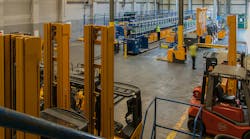Party Pooper Questions
Words, especially when they form questions, can make all the difference. Take economics, for example. For the last couple of years, we’ve heard all about the phenomena called the New Economy and the Dot-Coms.
The party began with Wow! There are some new economic organizations out there on the Web. They’re growing like cancer! Buy now or be forever regretful. It’s a party you don’t want to miss! What do they make? What kind of a party pooper question was that? They’re on the Internet! They’re what’s happening.
Those words were supposed to describe something new to us in terms of the nature of work, production and rewards. Millions bought into the new party.
Those millions of buyers and a few hundred sellers were buying stocks in companies that had little if any assets, turned no profits and, they often bragged, turned out no products. They were companies that made nothing.
Yet, they were bringing in billions in investment bucks as Dot-Coms. Things were "happening" on the Internet, not in the factories. It was a Brave New World. Factories were part of the Old Economy of assets, employees, returns, products even! How déclassé. Old Economy, even.
Even some of the most seasoned and wisest of investors confronted this New Economy with awe if not respect. After all, millions of people and not a few economists and politicians were jumping on this party bandwagon to the brighter day.
Then, the party poopers started asking their depressing questions. Where’s the return? What do they do, these Dot-Coms? Where are their business plans? And, the biggest party pooper question of all: WHAT DO THEY MAKE?
That last questions took most of the momentum out of the hustle, and the stock market headed down as fast as gravity would allow.
Millions (of guilders, I think) were made and lost in the tulip bubble a few hundred years ago in Holland. Tulip bulbs were going for the price of a good house! Sounds crazy? It didn’t then. People mortgaged to the max for a set of "Fancy Reds." Common sense took a vacation.
Billions were made and lost in the Tulip Dot- Com mania of the last few years right here in America. Lessons? Several I can think of. First, magic belongs on stage not on Wall Street. Second, the world will never run out of hustlers and hustle. Third, every new technology brings opportunity to all — including the opportunists.
Fourth, there is indeed a great deal of new and useful technology in our world. The Internet is a terrific tool. There are indeed many terrific companies that do much of their business on the Internet. Some of them are excellent investments, but they are so because they are run like sensible businesses. They help produce something by providing useful services. They plan to run profitably. They will survive. Many, many more of those earlier New Economy ventures were empty hustles.
Fifth and final lesson: tools are meant to be used to help make products or provide better services. If a new company doesn’t service or connect — somehow — with manufacturing plants that produce something people want and will buy, what then does that company do to help the economy? No good answer? Then, my advice is skip that party.
All of this should be obvious to anyone in manufacturing. Yet, like the Dutch experience of the 17th century, there’s something about a party that erases the party pooper words of common sense.
George Weimer
contributing editor


